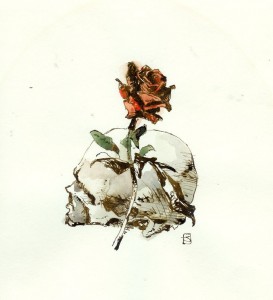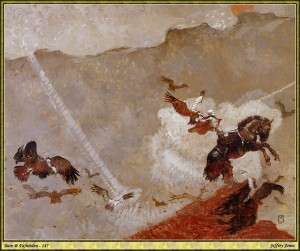The Collected Poetry of Robert E. Howard: First Impressions
Wednesday, March 25, 2009
posted by Deuce Richardson
 Print This Post
Print This Post

Today, right in the midst of a domicilic transition, The Collected Poetry of Robert E. Howard landed on my doorstep. Knowing the consequences of giving in to temptation, I steeled my will and carried on carryin’ on the washer and the fridge and the bookcases…
Night has fallen and I now give myself a most just reward, drinking deep from the cup of Howard’s poetic genius.
“Collected Poetry” is one hefty tome. Six hundred and eighty-four pages of poetry and prose poems. Fifty-plus pages of introduction and foreword. Forty-plus pages of annotations and indices. As usual for a Robert E. Howard Foundation edition, the production standards are excellent.
The introduction is a reprint of Steve Eng’s “Barbarian Bard” essay, a landmark piece in REH poetry studies written in the early ’80s. In his foreword, [redacted], noting Eng’s lack of access to many Howard poems, wonders whether Eng would have divided REH’s poetic ouevre into even more categories.
The categories are manifold as it is, ranging from “Wizardry & Satanism” to “Dialect & Doggerel”, with [redacted] using Eng’s essay as a template. Having loved and collected Robert E. Howard’s verse since childhood, I am still astounded by the breadth and depth of REH’s poetic reach. From Texan tavern to Candahar, and from moon-lit nights of passion to the black stars burning in the mad immensities of night, Howard paints his scenes with a sure hand and an instinctive grasp of rhythm and rhyme. Eng noted that Robert E. Howard’s poetic range was not unlimited, but such could be said of virtually any poet.
Howard did have subjects that obviously captured his imagination, which he came back to again and again. Babylon (and “Babel”) is invoked and evoked over and over, its ancient ground proving just as fertile for Howardian verse as it was for Mesopotamian barley. Dragon-ships surge through his poems as often they ever sailed the cold North Atlantic. Gaels and other Celts provide inspiration for poems of bloody mayhem, defiance and tragedy. Verse after verse ponders the eternal allure and primal mystery of Woman.
Of course, as with any collection striving for completeness, the quality of the poems is uneven. When one comes to the chapter entitled, “Dialect & Doggerel,” verse of uniformly deathless quality should not be counted on. Still, when one considers how many of Robert E. Howard’s poems were seemingly “tossed off” as spontaneous compositions while writing letters to friends, it is very hard to deny his abilities as a natural-born poet. As [redacted] has pointed out to me, nearly every scrap of Howard’s verse has a turn of phrase or stanza worthy of admiration.
Final verdict? Worth every penny.

Artwork by Jeffrey Jones
